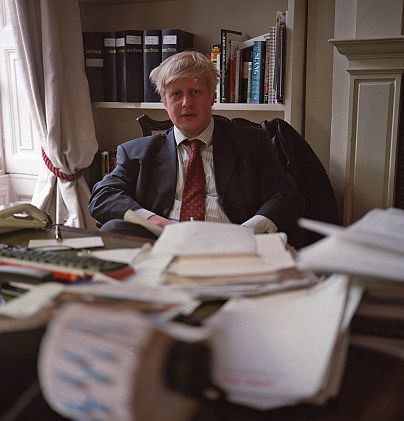The colorful Conservative lawmaker is the clear favorite to become prime minister after a party leadership contest this week.
LONDON — Dangling from zip-wire 30 feet high, dressed in a suit and holding two Union Jack flags, the then-mayor of London laughed as he cried out, "get me a ladder."
 ADVERTISEMENT
ADVERTISEMENT
 ADVERTISEMENT
ADVERTISEMENT
The image, taken during the London Olympic Games in 2012, has become one of the most symbolic of Boris Johnson's political career. It showed how he could be relatable and charming while stuck in a crunch.
"If any other politician anywhere in the world was stuck on a zip-wire, it would be a disaster. For Boris, it's an absolute triumph," then-Prime Minister David Cameron noted.
Seven years later, this colorful populist looks set Tuesday to become the leader of the Conservative Party — and therefore the United Kingdom's next leader, replacing Prime Minister Theresa May.
"Boris Johnson is as close to a rock star as any politician ever gets. He's like a magnet. People flock to have their photos taken with him," said Gareth Bacon, the leader of the Conservative members of the London Assembly, who was also in office during Johnson's tenure as mayor.
If Johnson, 55,is indeed elected by the 160,000 Conservative Party members over Foreign Secretary Jeremy Hunt, he would take up the role of prime minister as the U.K. faces what may be its biggest crisis since World War II.
The nation is going through a painful divorce from the European Union and must redraw its economic and political relationship with the powerful 28-member bloc.
No one knows how Brexit will play out. What is certain is that the U.K. is now scheduled by law to leave Oct. 31, unless the next prime minister can secure another extension.
It is still unclear which version of Johnson the U.K. would get as leader: the moderate Conservative who as mayor of cosmopolitan London was pro-immigration and socially liberal, or the pro-Brexit populist who railed against what he's called an "elite conspiracy to thwart Brexit."
If Johnson's time in City Hall is anything to go by, he will bring a spirit of optimism and achievement to the country, according to Bacon, who supported Johnson's candidacy for leader.
"He comes across as disheveled but there's a great brain behind Boris, and he used to delegate very well," he said.
"Boris is not a hard-right conservative. He is a cosmopolitan conservative. People who don't know him well will be surprised."
However, other observers are less convinced of Johnson's sincerity.
"Boris Johnson's main motivation is power and to get into power he has to promise people whatever it is they want to hear at the time," said Tim Bale, a professor of politics who also runs a project on party membership in the 21st century.
"If you want to be mayor of London, you have to present yourself as a tolerant and open-minded guy. If you want to become leader of Conservative Party, you have to present yourself as a conservative right-winger who is very much a nationalist."
Rocky relationship with the truth
Born in New York, while his father was studying at Columbia University, Johnson has taken a well-worn route through English upper-class society. He attended Eton College, the super-elite boarding school that educated Prince William and Prince Harry, as well as 19 other prime ministers. He then headed to Oxford University, the alma mater of 27 former British prime ministers.
Fittingly for someone often dismissed as a clown, Johnson rose to prominence in part thanks to his regular appearances on a comedy quiz show in the late 1990s. It was here that viewers came to know him as a blundering but sharp-witted commentator.
He was also a journalist who had spent five years as a Brussels correspondent for the right-leaning newspaper, the Daily Telegraph, where he wrote critical, andat times misleading, stories about the excesses of European Union bureaucracy.
This included news of a "banana police force" that would check that the fruit was the right shape across the union. The E.U. banana rules were in fact designed to stop dishonest producers from tampering with fruit by adding weights.
He's also caused outrage with his quips and some of his comments have been described as racist. In 2016, he called President Barack Obama "part-Kenyan"and suggested he had an "ancestral dislike of the British empire."
Meanwhile, his tempestuous private life, rife with reported affairs as well as his cover-ups of the dalliances, would have been enough to sink any normal politician. Indeed, the cover-ups led to his being fired from several political positions.
Just last month, at the height of the leadership campaign, Johnson's private life was back in the headlines when a recording of "a loud altercation involving screaming, shouting and banging" at the home of his girlfriend was passed to the Guardian newspaper.
Lead "leaver"
For Conservative Party members, one of Johnson's most endearing traits is his credentials as a leader of the 2016 referendum campaign to leave the E.U. A YouGov poll earlier this month put his lead over Hunt at 48 percent.
But Johnson's professed support for leaving the E.U. on Oct. 31, come what may, has raised the hackles of lawmakers in his own party even before he takes office. It is a scenario that business leaders and analysts warn could have dire economic consequences and one that many lawmakers in Johnson's own party have said they wouldn't support.
Several who served in government positions under May have offered their resignations or have said they would in anticipation of Johnson's victory.
What remains to be seen is if Johnson's antics and undiplomatic behavior will enhance his reputation and ability to govern, or if like the two previous occupants of 10 Downing Street, he will eventually be brought down by the realities of Brexit.











